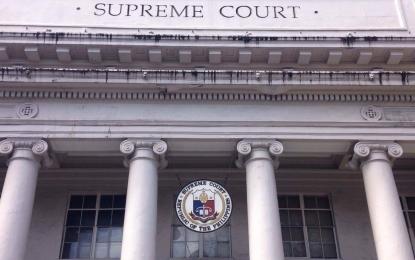News
SC affirms dismissal of PNP exec over anomalous vehicle repair project

In its decision, SC said Espina was charged with grave misconduct and serious dishonesty before the Ombudsman which found him guilty as charged, and imposed on him the supreme penalty of dismissal from government service with all its accessory penalties, while the Court of Appeals (CA) adjudged him guilty only of simple misconduct and punished him with a three-month suspension. (Photo: Philippine News Agency)
MANILA–The Supreme Court has partially granted the petition of Ombudsman finding former police director Rainier Espina guilty of gross neglect of duty in connection with the PHP400-million alleged ghost repair of 28 V-150 light armored vehicles of the Philippine National Police (PNP)
In its decision, SC said Espina was charged with grave misconduct and serious dishonesty before the Ombudsman which found him guilty as charged, and imposed on him the supreme penalty of dismissal from government service with all its accessory penalties, while the Court of Appeals (CA) adjudged him guilty only of simple misconduct and punished him with a three-month suspension.
“The petition is partly granted. The decision dated February 27, 2014 and the resolution dated July 15, 2014 of the Court of Appeals are hereby set aside. A new one is entered finding respondent Rainier A. Espina guilty of gross neglect of duty. Accordingly, he is dismissed from government service with all accessory penalties,” SC said in its 12-page decision dated March 15, 2017.
The charges stemmed from the anomalous repair of several light armored vehicles (LAV) and fictitious payments for repairs and purchases of police vehicles.
Aside from Espina, former PNP Chief Avelino Razon was also implicated, including former and incumbent PNP officials, former comptrollers Geary Barias, Eliseo dela Paz, among others.
Based on the case filed by the Ombudsman, Razon and the other officials, including Espina, had allocated Php400 million supposedly for the repair of 28 V-150 LAVs.
In a joint resolution in 2012, the Ombudsman indicted Espina and several other PNP officers for violation of Section 3 (e) of RA 3019, Section 65 (b) (4) of RA 9184, and for Malversation of Public Funds through Falsification under Article 217 in relation to Article 171 of the RPC.
The Ombudsman also found them guilty of grave misconduct and serious dishonesty and, accordingly, recommended their dismissal from government service.
Specifically, the Ombudsman held that Espina executed indispensable acts which led to the completion of the illegal transactions. It likewise found it incredulous that the repair and refurbishment works on the LAV s were completed in only seven days, i.e., from Dec. 20, 2007 to Dec. 27, 2007, considering the magnitude of the work involved, which included the delivery of the LAV s for repair, the inspection and acceptance of materials to be used.
But the CA found respondent Espina administratively liable only for simple misconduct, prompting the Ombudsman to seek redress with the high court.
The SC agreed with the Ombudsman’s findings.
“As correctly observed by the Ombudsman, it is improbable that the repair and refurbishment works on the LAVs were carried out from December 20 to 27, 2007, given the magnitude of the work involved and the fact that such period included the delivery of the LAV s for repair, the inspection and approval of the materials to be used for the repairs, the actual repair and refurbishment, and the delivery of the LA Vs to the PNP after the repair,” SC said.
“The foregoing should not have escaped Espina’s attention had he faithfully discharged the obligations attendant to his office,” the SC held.
“Indeed, the court has pronounced that a public officer’s high position imposes upon him greater responsibility and obliges him to be more circumspect in his actions and in the discharge of his official duties. This particularly applies to the instant controversy, especially where Espina’s signature was one of the final steps needed for the release of payment for the procured items. 66 In fact, the disbursement vouchers prepared by the Logistics Support Service (LSS) Finance Service were routed back to the CES of the Management Division under Espina’s supervision for final examination of all claims.”
The SC added, “Espina was expected to employ diligence in ensuring that all claims were supported by complete pertinent documents. As succinctly put by the CA, Espina’s duty as Acting Chief was not merely ministerial and perfunctory as it related to the disbursement of funds over which a great responsibility attached.”





















